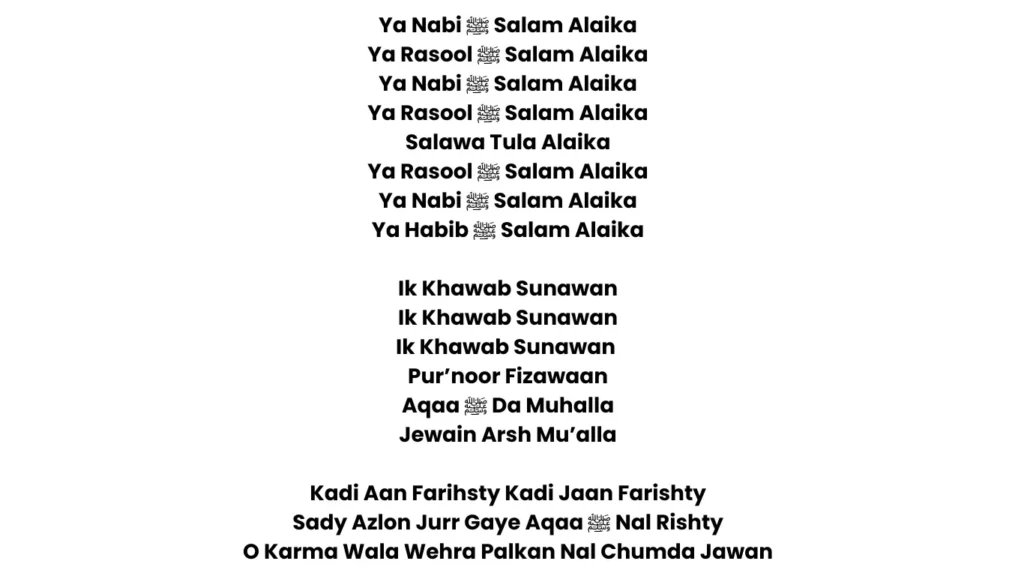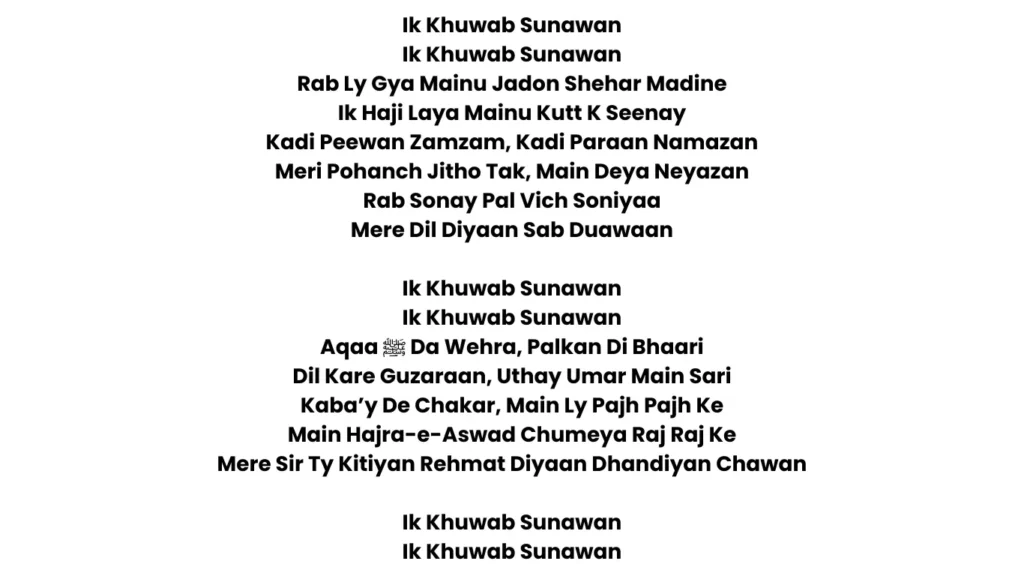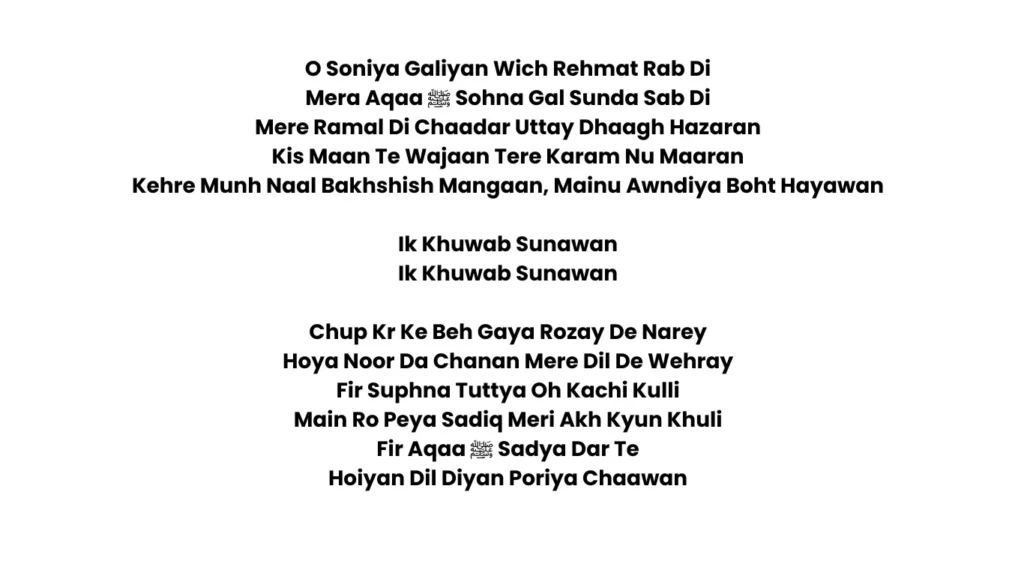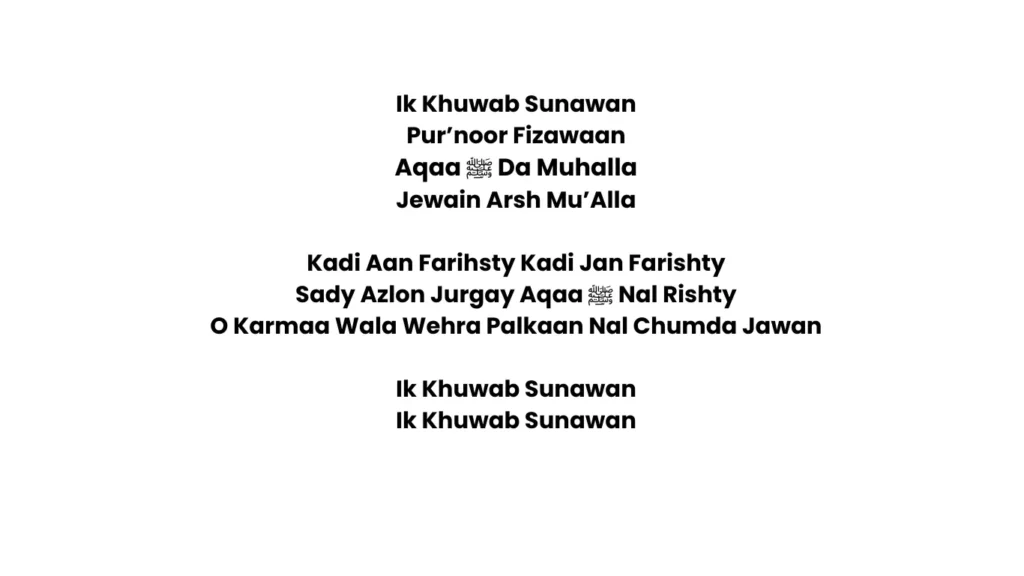Ik Khawab Sunawan is a naat (Islamic devotional song) that beautifully expresses a dream of visiting Madinah and Makkah, the sacred cities beloved by Muslims worldwide. The lyrics capture the speaker’s deep love, reverence, and yearning to be close to Prophet Muhammad (ﷺ) and to experience the holy places firsthand. Each verse in this naat creates an atmosphere of spiritual longing and devotion, making it a profound expression of faith and love.
| Shahe Madina Naat Lyrics |
| Muhammad ka Roza Lyrics | محمد کا روزہ |
| Hasbi Rabbi Jallallah Naat Lyrics in Urdu |
| Zah e Muqaddar Naat Lyrics in Urdu |
Exploring the Lyrics of “Ik Khawab Sunawan”
The naat begins with praises and salutations upon the Prophet Muhammad (ﷺ), a customary and beloved act in Islamic tradition, which sets the tone of respect and love for the Prophet (ﷺ).
Verse 1: “Ya Nabi ﷺ Salam Alaika, Ya Rasool ﷺ Salam Alaika”
This verse, repeated several times, translates to “O Prophet, peace be upon you,” and “O Messenger, peace be upon you.” It reflects the writer’s heartfelt respect and reverence for the Prophet Muhammad (ﷺ). The repetition emphasizes the depth of love and devotion, inviting listeners to join in this emotional expression of salutations.
Verse 2: “Ik Khawab Sunawan, Ik Khawab Sunawan, Pur’noor Fizawaan, Aqaa ﷺ Da Muhalla, Jewain Arsh Mu’alla”
In this verse, the speaker shares a dream of experiencing the luminous atmosphere surrounding the Prophet’s neighborhood in Madinah, comparing it to the heavens (“Arsh Mu’alla”). This imagery portrays the spiritual elevation and beauty of being close to the Prophet’s resting place, symbolizing a divine connection and purity.
- Translation: “I narrate a dream, a radiant atmosphere, the beloved Prophet’s neighborhood, like the exalted throne.”
Verse 3: “Kadi Aan Farihsty, Kadi Jaan Farishty, Sady Azlon Jurr Gaye Aqaa ﷺ Nal Rishty”
This verse depicts the connection of angels with the beloved Prophet Muhammad (ﷺ) and the eternal bond between the believers and the Prophet. The lyrics imply that the speaker’s heart and soul are intertwined with the Prophet, creating a relationship that transcends time and space.
- Translation: “Sometimes angels come, sometimes they leave; since eternity, we have a bond with the Prophet.”
Verse 4: “Rab Ly Gya Mainu Jadon Shehar Madine, Ik Haji Laya Mainu Kutt K Seenay”
Here, the speaker dreams of being taken to the city of Madinah, imagining himself among pilgrims and feeling embraced by the sacredness of the place. This scene reflects the intense yearning to visit Madinah, as well as the deep emotional impact of being close to the Prophet’s city.
- Translation: “God took me to the city of Madinah; a pilgrim embraced me tightly.”
Verse 5: “Kadi Peewan Zamzam, Kadi Paraan Namazan, Meri Pohanch Jitho Tak, Main Deya Neyazan”
In this verse, the speaker dreams of drinking Zamzam water and offering prayers, symbols of purity and devotion. This imagery reflects the desire to perform acts of worship in the holy land, highlighting the speaker’s commitment to faith and spirituality.
- Translation: “Sometimes I drink Zamzam, sometimes I offer prayers; wherever I reach, I present my offerings.”
Verse 6: “Aqaa ﷺ Da Wehra, Palkan Di Bhaari, Dil Kare Guzaraan, Uthay Umar Main Sari”
This verse reveals a longing to spend one’s entire life in the Prophet’s vicinity, symbolizing the speaker’s wish to remain spiritually connected to the Prophet (ﷺ). The emotional depth in this line speaks to the yearning for a lifetime of devotion.
- Translation: “The Prophet’s courtyard, the weight on my eyelids; my heart desires to spend my whole life there.”
Verse 7: “O Soniya Galiyan Wich Rehmat Rab Di, Mera Aqaa ﷺ Sohna Gal Sunda Sab Di”
In this verse, the speaker describes the blessed streets of Madinah, where divine mercy is abundant. The lines also convey that Prophet Muhammad (ﷺ) listens to everyone’s concerns, highlighting the Prophet’s compassion and kindness toward his followers.
- Translation: “In the beautiful streets, where God’s mercy resides, my beloved Prophet listens to everyone’s concerns.”
Verse 8: “Chup Kr Ke Beh Gaya Rozay De Narey, Hoya Noor Da Chanan Mere Dil De Wehray”
The lyrics here depict a vision of sitting quietly near the Prophet’s resting place (Rawdah), where the light of guidance fills the speaker’s heart. This serene and sacred moment represents the tranquility and peace one finds in the Prophet’s presence.
- Translation: “I sat quietly near the Prophet’s tomb, and my heart was illuminated with the light of guidance.”
Verse 9: “Fir Suphna Tuttya Oh Kachi Kulli, Main Ro Peya Sadiq Meri Akh Kyun Khuli”
This verse poignantly expresses the sadness of waking up from the dream, feeling the pain of separation from such a cherished experience. The speaker laments, questioning why he had to wake up from a dream so precious.
- Translation: “Then the dream shattered like a fragile shell, and I wept, wondering why my eyes had to open.”
Final Reflections on “Ik Khawab Sunawan lyrics”
“Ik Khawab Sunawan” is a powerful naat that captures the essence of love, yearning, and devotion for Prophet Muhammad (ﷺ) and the holy cities of Madinah and Makkah. The lyrics beautifully blend poetic imagery with deep spiritual significance, allowing listeners to feel the dreamlike experience of being close to the Prophet (ﷺ). This naat serves as a reminder of the significance of these sacred places in Islam and the emotional connection that Muslims feel with the Prophet and his legacy.




FAQs:
Ik Khawab Sunawan” translates to “I narrate a dream.” It refers to the singer’s dream of visiting the sacred cities of Madinah and Makkah, as well as being close to Prophet Muhammad (ﷺ). The song describes the emotional journey and longing to experience the spiritual beauty of these holy places.
Aqaa” is an Urdu term for “Master” or “Leader,” and it respectfully refers to Prophet Muhammad (ﷺ) in these lyrics. The term conveys deep reverence and love for the Prophet, highlighting his significance in the hearts of Muslims.
Madinah and Makkah hold great spiritual significance for Muslims. Makkah is home to the Kaaba, the holiest site in Islam, and Madinah houses the Prophet’s mosque and his resting place. Mentioning these cities in “Ik Khawab Sunawan” reflects the deep spiritual and emotional longing to visit these sacred places and connect with the legacy of the Prophet Muhammad (ﷺ).




